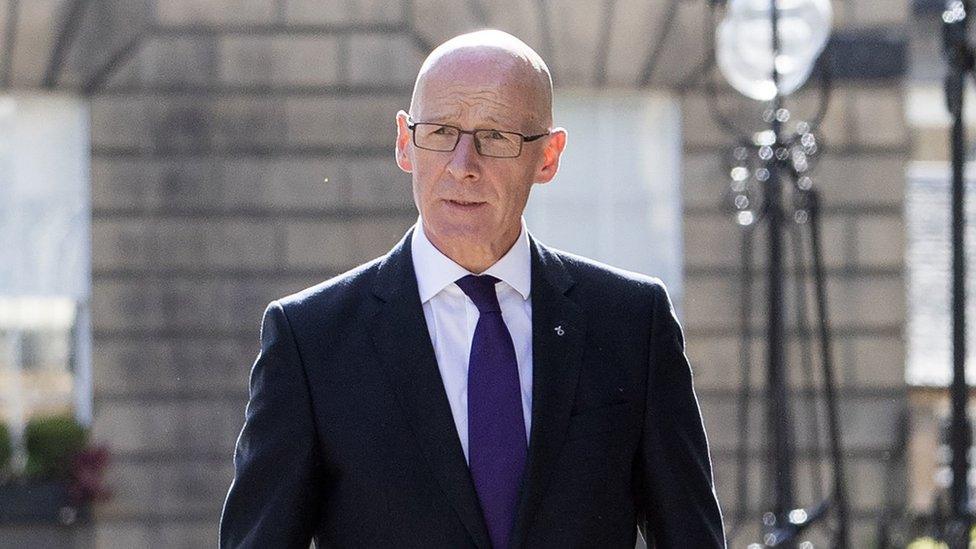Covid in Scotland: Public 'not ready' for vaccine passport scheme
- Published
- comments

People will need vaccine passports to get into nightclubs under new rules
The public is "not ready" for Scotland's Covid vaccine passport scheme, a trade body has warned.
UK Hospitality said the initiative should have been the focus of a dedicated Scottish government information campaign.
But the deputy first minister defended the certification and said it had generated huge media attention.
From Friday, people going to nightclubs and many large events will need proof they have had two doses of vaccine.
On Tuesday it was announced the system will not be enforced until more than two weeks after it is introduced.
First Minister Nicola Sturgeon said there would now be a "grace period" until 18 October.
It means there will be no enforcement action against businesses who do not comply with the rules before that date.
Leon Thompson, Scotland executive director of UK Hospitality, welcomed the decision to delay enforcement as businesses and the public were not ready.
He told BBC Radio's Good Morning Scotland programme: "One of the critical factors that has not really been talked about is just how ready the public is for the introduction of these passports. I would say they are not ready at all.
"We've repeatedly asked the Scottish government for some public information campaign to run so that businesses, front-of-house staff, when they are talking to customers at midnight or whenever checks are taking place, they know that the public will have the details on what they need and they will have their certificates ready.
"But there's been no public information put out so it has very much been left to businesses to manage this and that is one of the big concerns, particularly for the first weekend of the introduction."
Mr Thompson said the guidance put the onus on businesses to decide how they went about running the vaccine certification checks.
The government has drawn up a definition of a "nightclub" as a venue which is open between midnight and 05:00, serving alcohol, and which has a designated area for dancing and provides live or recorded music for this purpose.
Mr Thompson criticised the suggestion that checks could be carried out at midnight.
He added: "This is where the guidance is very weak because it does make suggestions like that but, I mean, practically that's not going to be possible."
Mr Thompson said the question of when checks are carried out for certification would also pose challenges for venues which are open much earlier in the day or evening.
And he hopes the two-week grace period will be followed by an extended period of "light touch regulation" to give everyone more time to get used to the new system.

Deputy First Minister John Swinney said ministers had responded to requests for a "slower launch"
Asked about the absence of a public information campaign, Deputy First Minister John Swinney told Good Morning Scotland: "It feels to me that there has been a lot of public attention about this.
"This has been a very significant issue in media communication.
"The government could not have been more open about setting out the details of the scheme in the briefings the first minister gives to parliament."
Mr Swinney also said it had been the subject of "extensive media interaction with ministers".
He said ministers had responded to requests from businesses for a "slower launch".
'Botched' scheme
A Scottish Conservative attempt to halt the introduction of vaccine passports was defeated at the Scottish Parliament on Wednesday evening.
Party leader Douglas Ross had said the delay showed that the "botched" scheme was "still not ready" just days before it is due to be introduced, and called for it to be scrapped completely.
He added: "It is more of the same last minute, rushed, chaotic planning we have seen time and time again from this government."
His motion was voted down following a debate.
All opposition parties voted against the scheme when MSPs previously considered it earlier in September, but the scheme was approved by MSPs from the SNP-Green partnership government.
Meanwhile, the Night Time Industries Association in Scotland is continuing its legal challenge through the courts in a bid to block the plans.
The industry body has put an application before the Court of Session which is being considered by judge Lord Burns.

